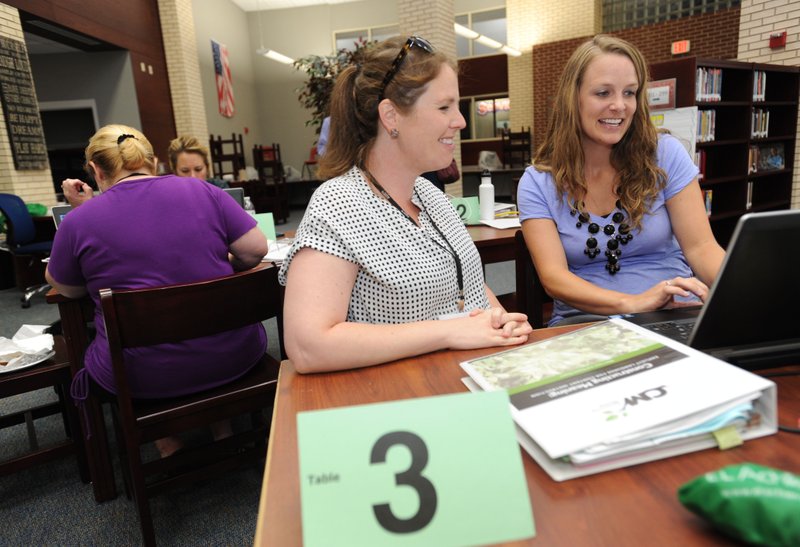SPRINGDALE -- Students whose first language isn't English may understand photosynthesis when it's taught in science class but have difficulty explaining the concept because they lack enough vocabulary to describe how plants use sunlight to make food.
English as a second language curriculum specialists in Rogers and Springdale have seen a need to provide more specific language instruction to help more students become fluent English speakers. Educators from both districts are being trained on strategies developed by the E.L. Achieve company in Rancho Santa Margarita, Calif.
Learning another language
Percentages of state’s English learners at each level of English proficiency
LevelKindergarten6th grade *12th grade
Little to no English11 %7 %*8 %
Beginning English29 %12 %*12 %
Intermediate English40 %25 %*21 %
Advanced English16 %52 %*38 %
Fully English Proficient5 % 4 %*21 %
Source: Arkansas Department of Education, 2014-15 results of English Language Development Assessment
Springdale English learners
10,173 students receiving language services in 2014-15
33 percent of students grew one level or more in language proficiency from 2013-14
87.1 percent of sixth- through 12th-graders were English learners for at least six years
65.7 percent of those students had attended Springdale schools since kindergarten
Source: Springdale School District
Springdale School District in 2014-15 had the largest population of students learning English in the state, with 10,173 students designated as being limited English proficient. Rogers School District had the second largest population and about 5,286 students with limited English proficiency.
E.L. Achieve supports educators who teach students advanced uses of English to help them express complex thoughts, said Libby Flores, director of client services for the company. E.L. Achieve works through two initiatives: Systematic English Language Development, and Constructing Meaning, Flores said.
The company works with more than 100 districts in 10 states, with most in Oregon and California. Rogers is using Systematic ELD, while Springdale is working with both initiatives.
Teachers in Springdale are learning strategies for helping students with academic writing, reading, speaking and listening, said Scott Townsend, an E.L. Achieve teacher from Oregon who has led training on Constructing Meaning this week at George Junior High School. The strategies are useful for all students but especially for English learners.
"The goal is to equip them with the language they need to express the sophistication of their understanding in the academic context," Townsend said.
Class talk
With Constructing Meaning, teachers of all content areas learn to give students time to talk in class about what they are learning and then to write what they are learning, Townsend said.
Constructing Meaning provides teachers with a way to structure time for talking so that students stay on task, Townsend said. Teachers can give students templates with words that are commonly used in building sentences, paragraphs and entire essays. Students then insert the content knowledge they have.
The program gives teachers ideas for helping students know what to say for common tasks, such as explaining, comparing or writing about cause and effect, he said. The templates are flexible and can incorporate new words students can use to build their understanding of English.
One template for writing a summary about an article provides an opening for a sentence, "The article titled," and then a blank for students to write the title. Students then have choices of verbs to use, such as "examines" or "addresses," and options for prepositional phrases, such as "the idea of" or "the importance of." Students finish the sentence with what they learned from the article.
Springdale School District began using the Constructing Meaning program in 2014-15, at Sonora Middle School, said Mary Bridgforth, the district's English Speakers of Other Languages Program coordinator. Other educators, including district literacy and math teachers on special assignment and district English as a second language specialists, also received training.
Constructing Meaning will be implemented in one elementary school, three more middle schools and two junior high schools in the new school year, Bridgforth said. The district also is training instructional facilitators and leader teachers in social studies, science and technology.
Springdale teachers who write curriculum are working with classroom teachers on incorporating Constructing Meaning strategies into daily lesson plans, said Christen Graham, an English as a second language curriculum specialist for Springdale who works with secondary schools.
Arkansas requires all students to learn in English, Graham said.
"We provide a lot of support for how you communicate the understanding," Graham said. "It's not giving answers."
Springdale's concern about students stalling in learning another language is an issue that schools across the country are facing, she said.
Once students in Springdale reach an intermediate to advanced level of English proficiency, they perform well on tests of their understanding of content, Graham said. They just haven't reached a level that shows they are on par with native English speakers.
Research for working with English learners has been limited, and emerging research suggests that explicit instruction on language is beneficial, Graham said.
"They haven't built the complexity of language that new standards are requiring of students," Graham said.
Content complexity
Springdale started implementing Systematic ELD in three elementary schools, one middle school and the district's Secondary Sheltered ESL program in 2014-15. The model will be implemented in seven more schools in 2015-16 and another seven in 2016-17, Bridgforth said.
As students advance through school, content becomes more complex, and they need to think at a more advanced level, said Megan Godfrey, an English as a second language curriculum specialist for elementary students. They may understand and think at higher levels, but they sometimes lack the language to express what they know, she said.
The first unit of the year in Systematic ELD will focus on language commonly used in school, such as what to say to ask for help or what to say when working with a partner, Godfrey said.
Rogers teachers of English speakers of other languages received training last year in Systematic ELD, said Jo Stevens, an elementary specialist in working with English learners. Schools began using the model in the 2014-15 school year with elementary pupils with lower levels of English proficiency.
The program provides 30 minutes of instruction each school day that focuses on how the English language works, she said.
Classroom teachers have used a variety of methods to help children whose first language is not English, Stevens said. They have obtained credentials for teaching English learners. They put pictures next to words on assignments. They act out math problems. Children work with partners.
However, students who have been in Rogers since kindergarten are leaving elementary school still needing English learner services, Stevens said.
Since implementing the new strategies, Stevens has heard teachers say some of their English learners are more willing to raise their hands in class and that they talk more in class, Stevens said.
"I think we're going to see our kids progress faster," Stevens said.
NW News on 07/31/2015

